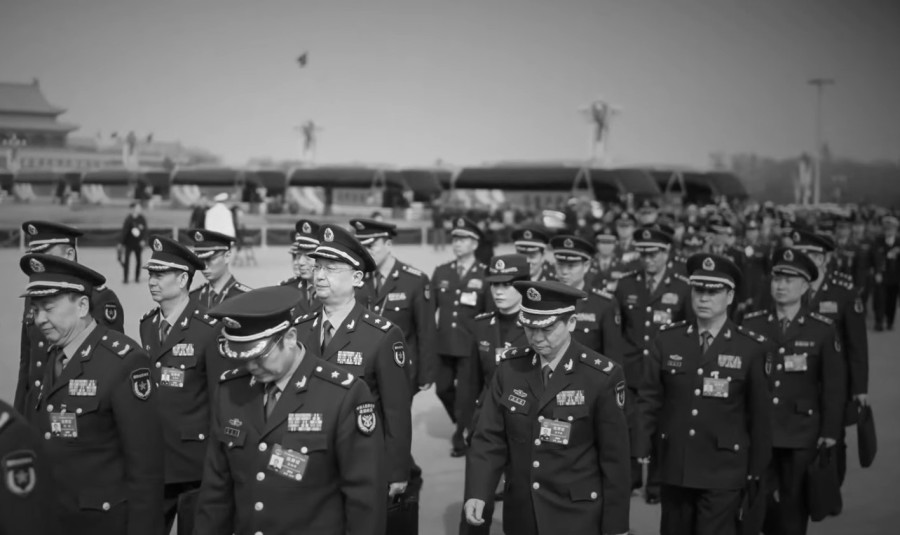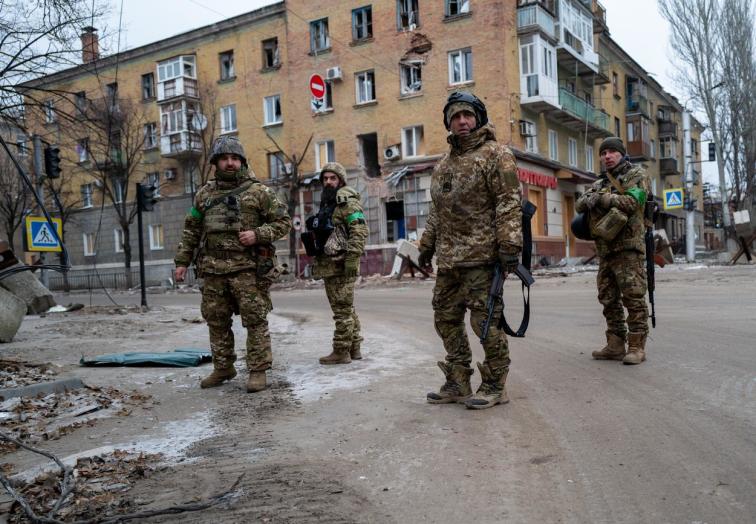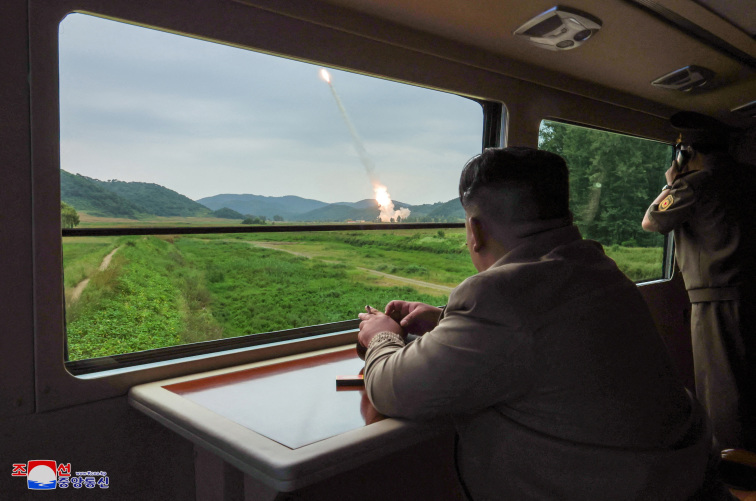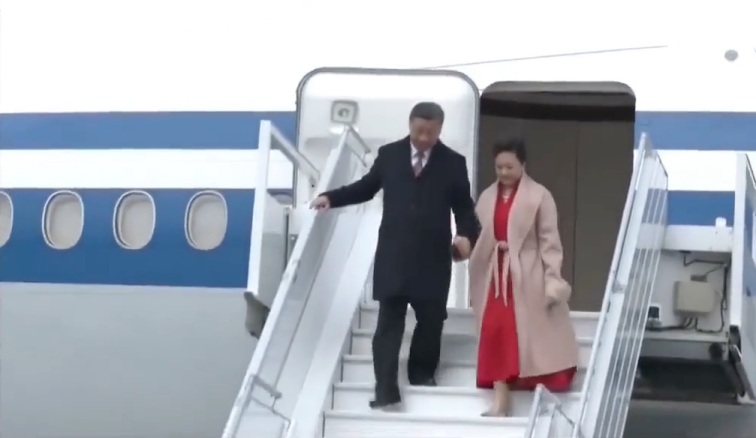The new prophecy mentions that Xi will face a rebellion from the military and local warlords. The image shows the representatives of the Chinese military attending the Two Sessions in Beijing. (Video screenshot)
[People News] On July 21, China’s official government website announced the latest round of appointments and removals of state officials. Among the changes, Ling Zhifeng, Director of the Political Department of the Ministry of Public Security, was appointed as Vice Minister. He will also concurrently serve as Secretary and Director of the Ministry’s Special Service Bureau. Previously, the head of the Special Service Bureau was another Vice Minister, Wang Zhizhong, who, according to a public notice in April this year, replaced Xu Ganlu — the former Vice Minister and Director of the National Immigration Administration — after Xu’s removal.
Earlier, on July 9, another round of personnel changes appointed Yang Weilin, Director of the Guangxi Public Security Department, as Vice Minister, while removing Vice Ministers Chen Siyuan and Sun Maoli from their positions.
After three rounds of personnel changes this year, the leadership of the Ministry of Public Security now includes, besides Minister Wang Xiaohong — whose power appears somewhat diminished — the following top officials (ranked according to the official listing): Vice Minister Qi Yanjun, who oversees daily operations; Discipline Inspection Chief Ren Airong; Vice Ministers Xu Datong, Wang Zhizhong, Ling Zhifeng, Yue Xiuhu (Counter-Terrorism Commissioner), Yang Weilin; and Assistant Minister Liu Zhongyi. Of these, Xu Datong was promoted in March 2023, Liu Zhongyi in March 2024, and Yue Xiuhu in June 2024 — all relatively recent appointments.
Xu Ganlu had a long-standing connection with Xi Jinping, dating back to their time in Fujian. In 1994, he was brought to Beijing’s Ministry of Public Security by then-Vice Minister Li Jizhou. In 2015, over two years after Xi became General Secretary, Xu was parachuted into Henan Province as Vice Governor and Director of the Henan Public Security Department, replacing Wang Xiaohong, who had been transferred to serve as Beijing Public Security Bureau Chief. Xu thereby entered sub-ministerial ranks. The following year, he was promoted to Henan Provincial Party Committee Standing Member and Secretary of the Politics and Law Commission. In 2018, he became a Party Committee Member and Vice Minister at the Ministry of Public Security, and served as the first Director of the newly established National Immigration Administration. In August 2023, Xu replaced Wang Xiaohong as President of the Police Association. Xu is clearly a member of Xi’s inner circle — the so-called Xi Jinping faction.
As for Chen Siyuan, Sun Maoli, and Qi Yanjun, all had career ties to Wang Xiaohong. Chen Siyuan, from Anhui, spent most of his career in Beijing’s public security system. He served as Deputy Chief of the Chaoyang and Xuanwu District Public Security Bureaus, then as Xuanwu District Party Standing Committee Member and Bureau Chief. In 2010, he became a Standing Committee Member of Beijing’s Xicheng District and Chief of the Xicheng District Public Security Bureau.
In March 2015, Wang Xiaohong transferred from Henan to Beijing as Vice Mayor and Chief of the Beijing Public Security Bureau. In December that year, Chen Siyuan was promoted to Party Committee Member and Deputy Director of the same bureau. In 2017, he was appointed Deputy Secretary of the Beijing Political and Legal Affairs Commission, Executive Deputy Director of the City’s National Security Office, and Director of the Stability Maintenance Office — still working closely with Wang Xiaohong.
In March 2018, with Xi Jinping’s backing, Wang Xiaohong was rapidly promoted to Executive Vice Minister of Public Security (a minister-level post). In February 2019, Chen Siyuan transferred to the Ministry and replaced Sun Lijun as Director of the First Bureau. Six months later, he was concurrently appointed Assistant Minister. At the time, the Public Security Minister was Zhao Kezhi. In June 2021, Chen was promoted to Party Committee Member and Vice Minister while retaining his leadership over the First Bureau.
Sun Maoli, from Jinan, Shandong Province, previously served as Deputy Director and later Director of the Ministry’s Legal Affairs Bureau, and concurrently as Director of the Office for Law Enforcement Standardisation Construction. He held the director position from 2009 for 13 years. In August 2022 — two months after Wang Xiaohong became Minister — Sun Maoli was promoted to Vice Minister. Prior to that, in May 2022, Qi Yanjun — also from Jinan — had been promoted to Vice Minister.
Qi Yanjun had earlier served as Chief of the Henan Fire Brigade, at the time when Wang Xiaohong was Head of the Henan Public Security Department. When Wang was transferred to Beijing, Qi soon followed. Sun Maoli likely gained favour with Wang Xiaohong via Qi Yanjun. These three are also seen as loyal followers (cronies) of the Xi faction.
Wang Zhizhong, who once replaced Wang Xiaohong as Deputy Director of the Special Service Bureau, was born in 1965. He previously served as Director of the Office of the Ministry’s Guard Bureau, Deputy Bureau-Level Researcher, and Deputy Director of the Special Service Bureau. In 2021, he was sent to Guangdong for training and appointed as Vice Governor, Head of the Provincial Public Security Department, and First Deputy Secretary of the Provincial Political and Legal Affairs Commission. Two years later, he returned to the Ministry as Vice Minister and concurrently served as Party Secretary and Director of the Special Service Bureau. This trajectory indicates a deep level of trust from Wang Xiaohong.
Currently, Xi loyalists Xu Ganlu, Chen Siyuan, and Sun Maoli have been dismissed, and Wang Zhizhong has been reassigned. On the surface, the first three were removed due to surpassing the age of 60, and Wang Zhizhong has just reached 60, the official retirement age. However, the concentrated timing of these removals and reassignments suggests that there is more going on beneath the surface. It reflects a decline in Xi Jinping’s power, and by extension, a weakening of the authority held by Wang Xiaohong — once one of Xi’s most trusted confidants — within the Ministry of Public Security.
Examining the Other Vice Ministers. Yang Weilin, born in 1968 and hailing from Jilin Province, previously held various key positions in the provincial public security system: head of the Anti-Drug Division, head of the Economic Crime Investigation Division, director of the Criminal Investigation Bureau, Vice Mayor and Public Security Bureau Chief of Siping City, Standing Committee Member and Secretary of the Political and Legal Affairs Commission in Siping, Executive Vice President of the Jilin High People’s Court, Senior Judge (first class), and later Vice Mayor and Public Security Bureau Chief in Changchun. In May 2023, Yang was transferred to serve as Vice Chairman of the Guangxi Autonomous Region and Director of its Public Security Department.
From his career history, Yang has no direct connection with Wang Xiaohong, making it unlikely he belongs to Xi’s faction. His recent transfer from Guangxi to the Ministry of Public Security was likely not Wang Xiaohong’s decision.
Ling Zhifeng, just promoted from Director of the Political Department to Vice Minister, is from Zhejiang. His career includes serving as Party Secretary and County Head of Chun’an County, Party Secretary of the Political and Legal Affairs Commission in Hangzhou, Public Security Chief in Shaoxing, Vice Mayor and Deputy Party Secretary in Shaoxing, and Party Secretary of Jinhua City. In 2018, he became Party Secretary and Director of the Zhejiang Emergency Management Department, and in 2021, he was appointed Party Secretary of Jinhua. In 2022, he went to Guangxi for experience before being transferred to the Ministry of Public Security in 2023.
Some analysts suggest Ling is connected to Cai Qi, but there’s no clear overlap in Zhejiang between them, as Cai Qi arrived in Zhejiang mid-career. The only plausible connection would have come later through networking. However, Ling did serve in Jinhua, where current Premier Li Qiang had significant political activity.
Li Qiang served as a Standing Committee Member in Jinhua in 1996 and later as Party Secretary of Yongkang. He went on to become Deputy Director of the General Office of the Zhejiang Government in 1998, and by 2002 was the youngest Party Secretary of Wenzhou. In 2004, he became Secretary-General of the Zhejiang Provincial Party Committee, overlapping with Xi Jinping. By 2011, he was concurrently serving as the province’s Political and Legal Affairs Secretary and later as Governor and Party Secretary of Jiangsu.
Given his extensive experience in Zhejiang, it’s entirely possible that Li Qiang has a favourable view of Ling Zhifeng and may have helped promote him. That potential support could explain Ling’s recent promotion and his appointment as head of the Special Service Bureau — despite not being one of Wang Xiaohong’s known allies.
Other Notable Figures with Unusual Backgrounds. Xu Datong, one of the higher-ranked Vice Ministers, was born in 1970 in Tianjin and graduated from Tianjin Foreign Studies University. He began his career in Tianjin, where he served in rapid succession as Director of the Binhai New Area Commerce Commission, Party Secretary and Director of the Tianjin Economic-Technological Development Area (TEDA), and Party Secretary of Wuqing District. His promotion trajectory has been exceptionally fast. In July 2019, Xu had his first cross-provincial appointment, becoming Vice Governor of Shaanxi Province, where he oversaw housing, urban and rural development, commerce, market regulation, foreign affairs, Hong Kong and Macau affairs, the Belt and Road Initiative, and the Free Trade Pilot Zone.
Xu Datong’s background is considered highly mysterious. Despite not coming from a public security background, he became Vice Minister of Public Security and rose quickly. Such advancement would be impossible without strong backing. Notably, last year he accompanied Wang Xiaohong in a meeting with Interpol President Ahmed Naser Al-Raisi — a sign of significant political stature.
Yue Xiuhu, currently the Ministry’s Counter-Terrorism Commissioner, presents another unusual case. Born in 1973, he worked for many years in the National Development and Reform Commission (NDRC). In October 2020, he was dispatched to Yunnan, where he held multiple roles: Party Secretary and Director of the Department of Ecology and Environment, Director of the Yunnan NDRC, Deputy Secretary-General of the Provincial Government, and later Vice Governor, concurrently serving as Public Security Chief and Director of the Provincial NDRC. In 2023, he returned to the Ministry of Public Security. What kind of background allows someone like Yue to progress through such diverse and high-ranking positions? He clearly has no visible connection to Wang Xiaohong and appears to have been parachuted into the Ministry — possibly as a member of a powerful “Red family” (descendants of CCP revolutionary elites)?
The frequency of personnel changes within the Ministry of Public Security indicates that Wang Xiaohong’s inner circle is being systematically sidelined, while Vice Ministers not appointed by him are emerging — each with their own distinct power base. Moreover, Wang Xiaohong himself has been behaving unusually, sometimes neglecting his official responsibilities. Could this signal a deeper purge of Xi Jinping’s faction from the Ministry? If this trend continues, Qi Yanjun, who turns 61 this year and is closely associated with Wang Xiaohong, might be the next Vice Minister to be removed.
(First published by People News)










News magazine bootstrap themes!
I like this themes, fast loading and look profesional
Thank you Carlos!
You're welcome!
Please support me with give positive rating!
Yes Sure!